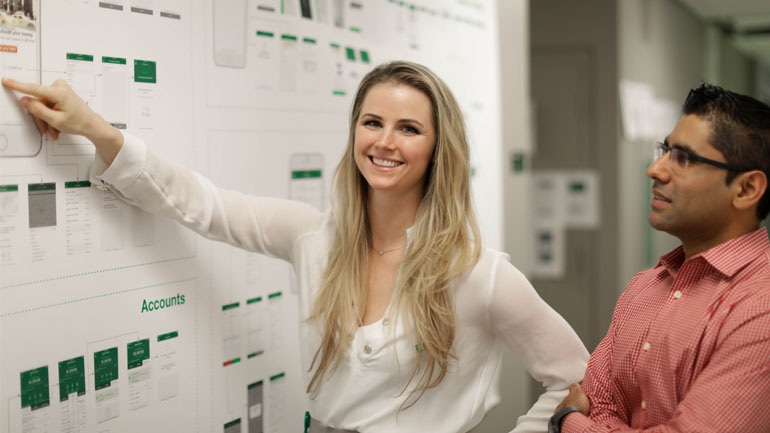This week, Canada's top artificial intelligence (AI) talent will be gathering in Toronto for an industry conference as part of the annual Elevate Technology Festival – a meeting ground for the next generation of innovators and leading tech experts to show the world how Canada can lead in the tech and innovation space. Paige Dickie (who is joining TD's AI group, Layer 6) will be speaking at this year's event about some of the challenges in building a Canadian AI industry that can remain competitive on the global platform.
Ahead of the conference, Dickie discussed what some of these challenges are, her career trajectory as a woman working in AI, and how her upcoming role with Layer 6 will support the bank's implementation of responsible AI practices.
How would you describe your experience as a woman in the field of AI?
PD: Companies are looking to diversify their teams and given the disproportionate male-to-female ratio within technology roles, I find the need for female representation is stronger than ever, leading to an overall broader pool of opportunities. I suppose this means I feel advantaged by my gender more than anything else. That said, I make it a point to exercise due diligence prior to accepting a new role to ensure I continue to surround myself with those who will give me fair and equal opportunities.
How would you describe your career journey so far?
PD: In a word: rewarding. Trying to decide what I wanted to be for the rest of my life never sat well with me, so I take things day by day and I'm happy with the results thus far. Having bounced around from engineering, to management consulting, to AI solutions for the banking industry, and machine learning research—I can truly say each experience has helped me grow in unique ways. I have no doubt that my next role at Layer 6 will challenge me all the same.
Can you tell us a little bit about your new role?
PD: I will help TD harness the power of AI and machine learning more effectively by working with different lines of business at the bank to understand the ins and outs of how they work, the products that they provide, and their customers to identify the opportunities and challenges each business line faces. The hope is that this top-down strategic approach towards the implementation of AI will enable us to increase successful uptake and adoption, subsequently improving the products, capabilities, and services we provide to our customers.
The Elevate conference aims to unite innovators to help solve society's challenges through diversity and collaboration. How important is it to you to help create broader diversity in AI, and how does diversity play a role in choosing the organizations you work with?
PD: One of my areas of interest has always been the topic of fairness in AI. To me, diversity means creating something that is better, and if the world isn't reflecting that, then we have the wrong measuring stick. Working to answer questions like, 'how can we responsibly build fair and unbiased AI and machine learning models?' is important to me as humans are building these tools and are therefore programming unconscious biases into them.
On the second question, it's also critical to me that I work in a place where I feel equal opportunity and diversity are valued. Everyone brings with them a unique set of experiences and skills, and it's through collaboration that I believe we're able to leap forward.
Q: We know you can't reveal too much ahead of the Elevate conference, but what can we expect from your talk with former TD CEO Ed Clark?
PD: Ed and I are part of a fireside chat discussing the challenges of building a Canadian AI ecosystem that can compete on the global platform. Possible topics include the war for tech talent, bridging the gap between academia and industry, supporting Canadian AI-based startups, economic impacts, and some broader questions around Canada's position in this global AI/wisdom race.
The Elevate AI conference, sponsored by TD, is a showcase of Canada's top AI talent and aims to equip students as future leaders in this industry with the skills needed for the jobs of tomorrow.
